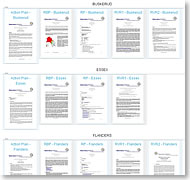Action Plan - South Transdanubia
| Attachment | Size |
|---|---|
| Action_Plan_-_South_Transdanubia.pdf | 36.06 KB |
Embedded Scribd iPaper - Requires Javascript and Flash Player
Observatory PASCAL
Place Management, Social Capital and Learning Regions PURE ACTION PLAN STH TRANSDANUBIA, HUNGARY July 2009 to December 2010
1.
In August-September 2009 At the end of August/early September the RCG (Regional Consultative Group) will consult representatives of society, the business sector, etc. in order to generate a rather settled understanding of the role of universities in regional development. RCG to debate and close the scrutiny of the RVR1 of the CDG for final review. The Regions benchmarking tool is studied and lists of participants made. HEI’s benchmarking tools to be sent out to relevant faculties to generate responses referring to deadline of 31 October. Cluster leader on Lifelong Learning and Learning Region has to be identified (hopefully it will be Prof. Longworth). Contact with David Campbell and Norman Longworth referring to Cluster activities. Collecting of recent figures and statistics concerning South Transdanubia, its economy, its population, its Higher Education: every figure must be evidence-based. Note on the principles lying behind regional engagement, based upon the figures and good practices gathered, on the third mission and holistic thinking attached to the Learning City-Region Forum of Pécs. Preparing the two cluster activities of the RCG members. CDG to finalize the revised RVR1 based upon its first visit examples of good practice.
2.
October 2009 Cluster meeting in the first half of the month on “Lifelong Learning and Learning Region”. 10.09: Full day forum on regional engagement with representatives of all relevant participants of the Learning Region Forum. Benchmarking tool has to be answered in the two universities’ faculties by 31st of October.
3.
November 2009 – December 2009 Meeting of the RCG with first conclusions on the benchmark and starting preparing the 2nd visit. (Planned for late February, early March 2010!). Preparing a compilation of good practices to be found at HEI’s of Kaposvár and Pécs.
4.
January 2010 – end of February 2010 Preparation of the second peer visit (planned for 22-23-24th of February or for 1-2-3rd of March 2010). All good practices found in South Transdanubia collected for the PURE website-link/browser. Making summaries of the outcomes of the two benchmarking exercises. Meeting with the RCG on the results so far.
Action Plan – Sth Transdanubia
http://www.obs-pascal.com/
Page |1
Observatory PASCAL
Place Management, Social Capital and Learning Regions 5. March 2010 – April 2010 The benchmarking tools and their further use: consideration with the users so far. Regional engagement and the lifelong learning initiative: what is the role of the third mission? Lessons learned so far. Possible Learning Region Cluster-meeting at the University of Pécs/ Hungarian Lifelong Learning Network National and International Conference. The PURE Regional Visit Report 2 concerning South Transdanubia - considerations on the project outcomes and meeting upon it with the RCG.
6.
May 2010 –June 2010 Pascal Jamtland International Conference with the PURE reports on the 15 regions that participated in the project on the forefront. Writing the overall report and measuring the progress made. Outline frameworks for the summary reports are made available. Each participating region provides a summary that will be included in the final synthesis report by December 2010.
7.
From July 2010 Work on the 1st cohort Action Plans, benchmarking etc., continues. Meeting of all PURE-regions in Gaborone in conjunction with the PASCAL conference and end of cohort 1. Final South Transdanubian PURE-meeting (November – December 2010) with all those who were and are involved: universities, university colleges, policy makers, business organizations, professionals out of the social and cultural sector, cities, ports and communities.
Conclusion The PURE-project will definitely point out the necessity to raise the importance of HEIs’ contribution to society, and that the third mission is to be considered as a holistic action frame for HEIs in both economic and societal development actions.
Balázs Németh
Action Plan – Sth Transdanubia
http://www.obs-pascal.com/
Page |2
Observatory PASCAL
Place Management, Social Capital and Learning Regions PURE ACTION PLAN STH TRANSDANUBIA, HUNGARY July 2009 to December 2010
1.
In August-September 2009 At the end of August/early September the RCG (Regional Consultative Group) will consult representatives of society, the business sector, etc. in order to generate a rather settled understanding of the role of universities in regional development. RCG to debate and close the scrutiny of the RVR1 of the CDG for final review. The Regions benchmarking tool is studied and lists of participants made. HEI’s benchmarking tools to be sent out to relevant faculties to generate responses referring to deadline of 31 October. Cluster leader on Lifelong Learning and Learning Region has to be identified (hopefully it will be Prof. Longworth). Contact with David Campbell and Norman Longworth referring to Cluster activities. Collecting of recent figures and statistics concerning South Transdanubia, its economy, its population, its Higher Education: every figure must be evidence-based. Note on the principles lying behind regional engagement, based upon the figures and good practices gathered, on the third mission and holistic thinking attached to the Learning City-Region Forum of Pécs. Preparing the two cluster activities of the RCG members. CDG to finalize the revised RVR1 based upon its first visit examples of good practice.
2.
October 2009 Cluster meeting in the first half of the month on “Lifelong Learning and Learning Region”. 10.09: Full day forum on regional engagement with representatives of all relevant participants of the Learning Region Forum. Benchmarking tool has to be answered in the two universities’ faculties by 31st of October.
3.
November 2009 – December 2009 Meeting of the RCG with first conclusions on the benchmark and starting preparing the 2nd visit. (Planned for late February, early March 2010!). Preparing a compilation of good practices to be found at HEI’s of Kaposvár and Pécs.
4.
January 2010 – end of February 2010 Preparation of the second peer visit (planned for 22-23-24th of February or for 1-2-3rd of March 2010). All good practices found in South Transdanubia collected for the PURE website-link/browser. Making summaries of the outcomes of the two benchmarking exercises. Meeting with the RCG on the results so far.
Action Plan – Sth Transdanubia
http://www.obs-pascal.com/
Page |1
Observatory PASCAL
Place Management, Social Capital and Learning Regions 5. March 2010 – April 2010 The benchmarking tools and their further use: consideration with the users so far. Regional engagement and the lifelong learning initiative: what is the role of the third mission? Lessons learned so far. Possible Learning Region Cluster-meeting at the University of Pécs/ Hungarian Lifelong Learning Network National and International Conference. The PURE Regional Visit Report 2 concerning South Transdanubia - considerations on the project outcomes and meeting upon it with the RCG.
6.
May 2010 –June 2010 Pascal Jamtland International Conference with the PURE reports on the 15 regions that participated in the project on the forefront. Writing the overall report and measuring the progress made. Outline frameworks for the summary reports are made available. Each participating region provides a summary that will be included in the final synthesis report by December 2010.
7.
From July 2010 Work on the 1st cohort Action Plans, benchmarking etc., continues. Meeting of all PURE-regions in Gaborone in conjunction with the PASCAL conference and end of cohort 1. Final South Transdanubian PURE-meeting (November – December 2010) with all those who were and are involved: universities, university colleges, policy makers, business organizations, professionals out of the social and cultural sector, cities, ports and communities.
Conclusion The PURE-project will definitely point out the necessity to raise the importance of HEIs’ contribution to society, and that the third mission is to be considered as a holistic action frame for HEIs in both economic and societal development actions.
Balázs Németh
Action Plan – Sth Transdanubia
http://www.obs-pascal.com/
Page |2








